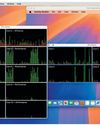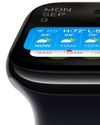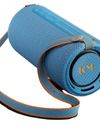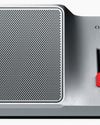
YOU WILL LEARN
How solid-state drives store data, and the things to look out for when buying and using one
SSDs offer a quieter, more reliable and faster way to read and write your data
When you buy a new Mac, you can choose how much storage you want.
Our advice? Don’t rush your decision. While opting for a higher capacity drive is going to cost you hundreds or, in some cases, thousands, making the correct, upfront choice will determine how useful your Mac will be in the future. One thing’s for sure, don’t bank on going larger later down the line!
Not too long ago, the situation weighed less heavily on your wallet. The choice of high-capacity internal computer storage was generally limited to hard drives (highly-mechanised devices which use a head to read and write data on rapidly spinning discs (aka magnetic coated platters) and they were easier to access and relatively inexpensive compared to the solid-state drives (SSDs) that Apple now places in its modern machines.
Yet there are myriad reasons for why you shouldn’t grumble too much about the move towards SSDs. Ever since Apple made them a factory option for internal storage for the MacBook Air in January 2008 – and ditched hard drives for good three years ago – they’ve offered a quieter, more reliable and faster way to read and write your data. They also generate less heat, draw less juice and offer shorter startup times. But how do they work?
Life ahead
This story is from the {{IssueName}} edition of {{MagazineName}}.
Start your 7-day Magzter GOLD free trial to access thousands of curated premium stories, and 9,000+ magazines and newspapers.
Already a subscriber ? Sign In
This story is from the {{IssueName}} edition of {{MagazineName}}.
Start your 7-day Magzter GOLD free trial to access thousands of curated premium stories, and 9,000+ magazines and newspapers.
Already a subscriber? Sign In

Mac hardware
We help to solve your hardware hassles, from interrupted upgrades to running diagnostics

Give your iPhone a whole new look in iOS 18
Make your iPhone uniquely you

iPhone 16
Apple Intelligence-ready smartphone for the rest of us

Apple Watch Series 10
10th anniversary Watch is now slimmer with an even bigger display

AirPods 4
Apple's most affordable AirPods remain a brilliant buy

We. HEAR Pro
Room-filling sound from this stylish wireless speaker

HiDock H1
An impressive 11-port AI audio dock for conferencers

Adobe Premiere Elements 2025
Create eye-catching videos for sharing on social media

Photoshop 2024
Your imagination is the limit with this AI-powered pixel creator

Wispr Flow
Bring the power of AI dictation to DMs, documents and Discord chats